#virginia house of delegates
Explore tagged Tumblr posts
Text
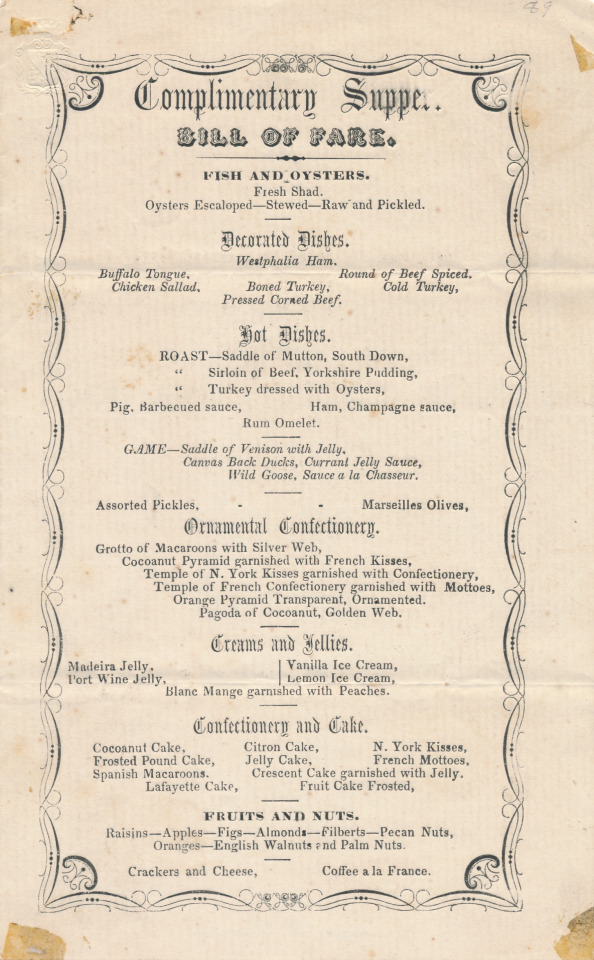
Recent Acquisition - Ephemera Collection
Complimentary Supper to Major Oscar M. Crutchfield, Speaker of the House of Delegates, given by the Members and Officers of the House, at the Exchange Hotel, Richmond, March 10th, 1856.
#vintage#ephemera#VA#Virginia#Virginia House of Delegates#menu#Exchange Hotel#1850s#Richmond#food#Speaker of the House of Delegates
31 notes
·
View notes
Text
youtube
Abortion is the major issue in Virginia's state legislative elections on Tuesday.
Republicans control the governor's office and the House of Delegates – the lower chamber of the Virginia legislature. Democrats hold a narrow majority in the Senate – the upper chamber.
Virginia is the only state in the South which observes full reproductive freedom. GOP Gov. Glenn Youngkin (AKA: Glenn Trumpkin) is pushing a measure to restrict abortion. Trumpkin has national ambitions and wants to re-enforce his hardline credentials by pandering to the MAGA crowd.
If Democrats do not end up with control of at least one chamber of the legislature after Tuesday's election then Virginia will join the rest of the South as a place where Republican officials have a virtual regulator in every OBGYN office in the state.
Legislative elections can be decided by very narrow margins. And the tightest race for the Virginia Senate seems to be the 24th Senate District where incumbent Democrat Monty Mason is fighting a challenge by Republican J.D. Diggs. In a Washington Post article about the race in the 24th district, Karen Tumulty reports...
Across Virginia, abortion has become the overriding issue on the airwaves for the Democrats, highlighted in more than 40 percent of their ads. Republicans are talking about it in only 3 percent of theirs, according to the tracking firm AdImpact. But Mason noted: “People bring it up to me. I don’t have to lead with it in a lot of places.” That is because Virginia is the last Southern state where the procedure has remained widely available after the Supreme Court overturned Roe v. Wade in 2022. Abortion in Virginia is legal up to 26 weeks of gestation.
A vote in the Virginia legislative election is important anywhere in the state. But it's even more important in these swing districts.
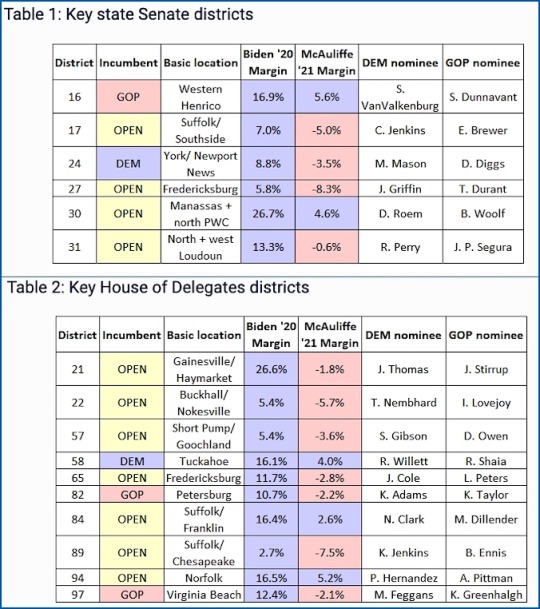
^^^ those charts come from this excellent article at the UVA Center for Politics.
The Race for Virginia’s Legislature, Part Two
If you'd like to know which legislative districts you're in, in Virginia or ANY state, find out here.
Find Your Legislators Look your legislators up by address or use your current location.
There's statistical evidence that Virginia voters in the 18 to 29 group can swing an election.
In 2020, Democrat Joe Biden easily carried Virginia in the presidential election; voters 18 to 29 overall made up 14.6% of the Virginians who took part in that election. In 2021, Republican Glenn Youngkin/Trumpkin won the race for Virginia governor; 18 to 29 voters were just 9.1% of the Virginia voters in that election. (source)
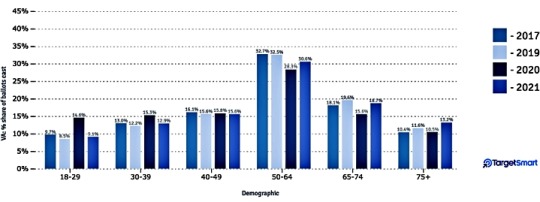
VOTE! If you live outside Virginia but know people there, send them a quick message to remind them to vote.
There's no such thing as an unimportant election.
#virginia#state government#election 2023#virginia legislature#virginia senate#virginia house of delegates#glenn youngkin#glenn trumpkin#republicans#abortion#republicans always try to ban abortion#reproductive freedom#roe v.wade#dobbs v. jackson women's health organization#a woman's right to choose#pro-choice#younger voters#the youth vote#there is no such thing as an unimportant election
15 notes
·
View notes
Text
A Unanimous Vote -- A Rarity Indeed!
Can you even begin to imagine our legislature voting unanimously on anything? State legislatures are typically no better, there is conflict and differences of opinion almost wherever one goes these days. But something unique and inspiring happened in Virginia’s House of Delegates this week, and our friend Annie is here to tell us about it! In a Country Not Yet Reconciled With Its Past,…
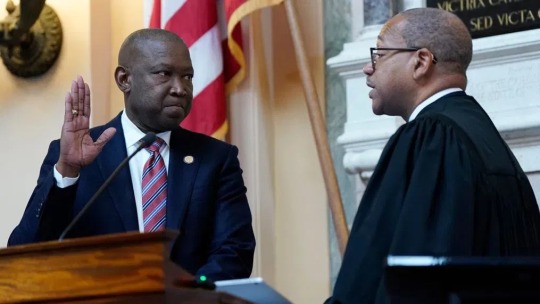
View On WordPress
0 notes
Text
Progress in Virginia still demands some patience
Decades of practice as a Virginia voter have tempered my expectations of progress in any one General Assembly session. And yet...
The Virginia General Assembly is now past the halfway mark of its first session under Democratic control since the 2021 session, and I have to admit that I expected a little more out of my state’s legislature now that Republicans can’t quietly sink decent bills in committees as they did in the House of Delegates in the previous two-year session. It’s not that the Western Hemisphere’s oldest…

View On WordPress
#anti-SLAPP#campaign finance#crossover day#direct tax prep#Glenn Youngkin#House of Delegates#leaf blowers#Richmond#Virginia Democrats#Virginia General Assembly#Virginia iFile#Virginia Senate
0 notes
Text
Robert Reich's Substack:
Friends, For years, conservatives have railed against what they call the “administrative state” and denounced regulations. But let’s be clear. When they speak of the “administrative state,” they’re talking about agencies tasked with protecting the public from corporations that seek profits at the expense of the health, safety, and pocketbooks of average Americans. Regulations are the means by which agencies translate broad legal mandates into practical guardrails. Substitute the word “protection” for “regulation” and you get a more accurate picture of who has benefited — consumers, workers, and average people needing clean air and clean water. Substitute “corporate legal movement” for the “conservative legal movement” and you see who’s really mobilizing, and for what purpose.
**
[...] Last week, the Supreme Court made it much harder for the FTC, the Labor Department, and dozens of other agencies — ranging from the Environmental Protection Agency to the Food and Drug Administration, Securities and Exchange Commission, Occupational Safety and Health Administration, Consumer Financial Protection Bureau, and National Highway and Safety Administration — to protect Americans from corporate misconduct.
On Thursday, the six Republican-appointed justices eliminated the ability of these agencies to enforce their rules through in-house tribunals, rather than go through the far more costly and laborious process of suing corporations in federal courts before juries. On Friday, the justices overturned a 40-year-old precedent requiring courts to defer to the expertise of these agencies in interpreting the law, thereby opening the agencies to countless corporate lawsuits alleging that Congress did not authorize the agencies to go after specific corporate wrongdoing. In recent years, the court’s majority has also made it easier for corporations to sue agencies and get public protections overturned. The so-called “major questions doctrine” holds that judges should nullify regulations that have a significant impact on corporate profits if Congress was not sufficiently clear in authorizing them.
[...] In 1971, the U.S. Chamber of Commerce, then a modest business group in Washington, D.C., asked Lewis Powell, then an attorney in Richmond, Virginia, to recommend actions corporations should take in response to the rising tide of public protections (that is, regulations). Powell’s memo — distributed widely to Chamber members — said corporations were “under broad attack” from consumer, labor, and environmental groups. In reality, these groups were doing nothing more than enforcing the implicit social contract that had emerged at the end of World War II, ensuring that corporations be responsive to all their stakeholders — not just shareholders but also their workers, consumers, and the environment.
[...] The so-called “conservative legal movement” of young lawyers who came of age working for Ronald Reagan — including Chief Justice John G. Roberts Jr. and Justices Clarence Thomas and Samuel A. Alito Jr. — were in reality part of this corporate legal movement. And they still are. Trump’s three appointments to the Supreme Court emerged from the same corporate legal movement. The next victory of the corporate legal movement will occur if and when the Supreme Court accepts a broad interpretation of the so-called “non-delegation doctrine.” Under this theory of the Constitution, the courts should not uphold any regulation in which Congress has delegated its lawmaking authority to agencies charged with protecting the public. If accepted by the court, this would mark the end of all regulations — that is, all public protections not expressly contained in statutes — and the final triumph of Lewis Powell’s vision.
Robert Reich wrote an interesting Substack piece on the history of the right-wing war on regulatory power that began with the infamous Powell Memo by Lewis Powell, and culminated with the recent Loper Bright Enterprises, Jarkesy, and Trump rulings.
#Robert Reich#SCOTUS#Courts#Leonard Leo#Lewis Powell#Judicial Activism#Major Questions Doctrine#Loper Bright Enterprises v. Raimondo#SEC v. Jarkesy#Powell Memo#Nondelegation Doctrine#John Roberts#Samuel Alito#Clarence Thomas#Regulatory Powers#Trump v. United States
68 notes
·
View notes
Photo

Thomas Jefferson
Thomas Jefferson (1743-1826) was an American lawyer, statesman, philosopher, and a Founding Father of the United States. A prominent figure of the American Revolution, he wrote the Declaration of Independence and later served as the first secretary of state, the second vice president, and the third president of the United States (served 1801-1809).
Early Life
Thomas Jefferson was born on 13 April 1743 at Shadwell Plantation in Albemarle County, Virginia. He was the third of ten children born to Peter Jefferson, a wealthy planter and land surveyor, and Jane Randolph Jefferson, a daughter of one of Virginia's most influential families. When Peter Jefferson died in 1757, 14-year-old Thomas inherited 5,000 acres of land as well as 60 enslaved people. From 1758 to 1760, he was privately tutored by Reverend James Maury before going on to the colonial capital of Williamsburg to attend the College of William & Mary. In his first year at college, he spent lavishly on parties, horses, and clothing, but he would soon regret this "showy style of living" (Boles, 18). His second year, therefore, was much more studious; he would apparently spend 15 hours a day at his studies, pausing only to exercise or to practice his violin.
The studious Jefferson soon became the protégé of mathematics professor William Small, who he would fondly remember as "the first truly enlightened or scientific man" he had ever met (Boles, 17). Small introduced Jefferson to the two other great intellectuals in Williamsburg – law professor George Wythe and Lt. Governor Francis Fauquier – and, at their weekly dinner parties, the four men would discuss politics and philosophy, greatly influencing the young Jefferson's political and intellectual development.
After completing his formal studies in 1762, Jefferson remained in Williamsburg to study law under Wythe and was admitted to the Virginia bar five years later in 1767. In 1768, he was elected to the House of Burgesses, representing Albemarle County. That same year, he began construction of a new home atop an 868-foot-high (265 m) mountain that overlooked his plantation. Called Monticello – Italian for "little mountain" – the house became the passion of Jefferson's life, and he would spend the next several decades designing and renovating it. The actual labor, of course, was mostly performed by his slaves; over the course of his lifetime, Jefferson owned approximately 600 enslaved people, most of whom were born into slavery on his property.
In 1772, after several failed romantic pursuits, Jefferson was finally married to the beautiful young widow Martha Wayles Skelton. Five years his junior, Martha shared his passions for literature and music; indeed, they often played music together – she on the harpsichord, he on the violin. The couple would have six children, only two of whom – Martha 'Patsy' (1772-1836) and Mary 'Polly' (1778-1804) – would survive to adulthood. When Jefferson's father-in-law died in 1773, he and Martha inherited 11,000 acres of land and 135 more enslaved people. By then, Jefferson had become involved with Virginia's struggle against Great Britain. Parliament's attempts to tax the colonists without their consent were vehemently opposed by the American Patriots, who saw such taxes as violations of their 'rights as Englishmen'. In 1774, Jefferson argued as much in his A Summary View of the Rights of British America. In it, he asserted that the colonies had the right to govern themselves, that they were tied to the English king only through voluntary bonds and that Parliament had no right to interfere in their affairs. This work earned him recognition as a Patriot leader in Virginia and led to his appointment as a delegate to the Second Continental Congress in Philadelphia in the spring of 1775.
Writing the Declaration of Independence
Jean Leon Gerome Ferris (Public Domain)
Continue reading...
25 notes
·
View notes
Text
West Virginia Republicans passed a bill that would allow librarians to be prosecuted if kids see books people find objectionable.... this is the future Republicans want nation wide, vote to stop them this November if you like freedom.
69 notes
·
View notes
Text

Franklin
Strictly speaking, Richard, while Virginia's views on independence are well-known, your legislature in Williamsburg has never formally authorized your delegation here in Congress to support the cause. Of course, if we could think of a Virginian with enough influence to go down there and persuade the House of Burgesses--
Lee
My name is Richard Henry Lee, Virginia is my home!
And may my horses turn to glue if I can't deliver unto you
A resolution, on independency!
#wttt#welcome to the table#my doodles#wttt fanart#wttt virginia#GUESS WHO IS WATCHING THE MUSICAL FOR THE FIRST TIME
27 notes
·
View notes
Text

@Wuerker
* * * * *
THE ELMO & VIVEK SHOW
TCinLA
Nov 24, 2024
Looking for something to give a pair of rich dorks who he wants to keep around f or their money, last week Trump appointed Elon Musk and Vivek Ramaswamy to co-lead the “Department” of Government Efficiency” (DOGE). The appointment makes them official DOGEBAGS.
The real name of this meme masquerading as a “government department” is The Department Of Breaking Shit We Don’t Understand.
Last Wednesday, the two dildos spelled out their plans in a long article in The Wall Street Journal that revealed them as pair of idiots who consider themselves geniuses despite the fact neither has a clue how government actually works.
They claimed they will “serve as outside volunteers” - which means neither has to face a background check they couldn’t pass or has to divest themselves of their money-making operations. They will be making recommendations that allow the Trump administration to “cut the federal government down to size.” Their primary focus is on cutting down the total number of federal agencies, which they view as wasteful and “antidemocratic.”
“Most legal edicts aren’t laws enacted by Congress but ‘rules and regulations’ promulgated by unelected bureaucrats,” write the two unelected self-proclaimed geniuses. This demonstrates their ignorance of the Adminitrative Procedures Act, in which Congress delegates the power to administer a law to the agency tasked with carrying that out. Admittedly, all this may change as the result of the Unsupreme Court overthrowing the Chevron Rules in the recent Loper Bright v. Raimondo and West Virginia v. Environmental Protection Agency cases - in which the court suggested that many current federal regulations exceed the authority Congress has granted under the law - but it’s an important marker that these two have no real clue what they’re talking about.
Musk and Ramaswamy say they’ll hire “a lean team of small-government crusaders” to work with the Trump administration and the White House Office of Management and Budget, working with Chief Sledghammer Wielder Russell Vought, who is returning as Director of the OMB.
According to the pair of dimbulbs, DOGE will work with legal experts embedded in government agencies, aided by advanced technology, to apply the new rulings to federal regulations. DOGE will present this list of regulations to be done away with to President Trump, who can, by executive order, immediately pause enforcement of those regulations and initiate the process for review and rescission.
What they fail to realize that that they have been put in charge of a non-existent “department” that can make recommendations which would be entirely dependent on members of Congress—who will think twice about cutting $2 trillion dollars from programs that directly impact their constituents.
Muck & Vivek see Trump cutting “thousands” of federal regulations that will allow for “mass head-count reductions” of government employees. DOGE will try to determine the “minimum number of employees required at an agency for it to perform its constitutionally permissible and statutorily mandated functions.” This will almost certainly hamstring many government agencies, which enforce everything from environmental protections to healthcare standards.
The two “experts” also suggest that Trump can require federal employees to return to their offices five days a week, which could bring about “voluntary terminations.” “If federal employees don’t want to show up, American taxpayers shouldn’t pay them for the Covid-era privilege of staying home.”
The two specifically list federal expenditures they want to put on the chopping block, including “$535 million a year to the Corporation for Public Broadcasting” and “$1.5 billion for grants to international organizations to nearly $300 million to progressive groups like Planned Parenthood.”
In truth, the Elmo & Vivek Show reveals they are a pair of 12-year-old boys who know nothing about the world but are confident that they can make that world bend to their will because they are 12-year-old boys who don’t fucking know better.
They claim they will be able to “eliminate the need” for DOGE’s existence by July 4th, 2026. Since that’s about the time the mid-term election campaign will be heating up, their decision to make themselves scarce will be welcomed by those Republican congress critters who who represent “competitive” districts.
That idea that DOGE will have accomplished its goals in 18 months also reveals that these two idiots not only have no clue, but no fucking clue, about what will happen with their recommendations. Those that don’t get dropped for pissing off people Trump can’t afford to piss off will immediately land in court, where the legal process will hang them up through the mid-term elections, after which Trump will definitely be a “lame duck,” and hopefully a lame duck who has to deal with a Democratic majority in both houses of congress - the result of Democrats benefiting from an election map as favorable to them in 2026 as the 2024 map was to Republicans.
Topping off the Elmo & Vivk Shitshow is the news they will “work closely” with Marjorie Traitor Goon, who House Oversight Committee Chairman Comer the Gomer has appointed to chair the DOGE Subcommittee on Governmental Efficiency.
What we’re looking at is a pair of arrogant dipshits who have no idea how government works, working with the Dumbest Bimbo in Congress, who has no idea how anything works. Does anyone really think nothing can go wrong with this?
As AOC put it, “This is good, actually. She barely shows up and doesn’t do the reading. To borrow a phrase I saw elsewhere, it’s like giving someone an unplugged controller. Absolutely dying at those two now getting assigned the ‘privilege’ of ‘working’ with MTG. That is actually hilarious. Enjoy, fellas! Very prestigious post you have there.”
[TCinLA]
#political cartoons#flood the zone#Wuerker#TCinLA#incoming#cabinet appointments#Elmo & Vivk Shitshow
14 notes
·
View notes
Text
BREAKING: Candidate in high-stakes Virginia election performed sex acts with husband in live videos
This is Susanna Gibson, who is running for a seat in the narrowly divided Virginia statehouse. As recently as last year she was posting as “HotWifeExperience” on the website Chaturbate, where men could pay tokens to get her to perform specific sex acts.
By the way, she has two young children.
#news#pay attention#educate yourselves#educate yourself#knowledge is power#reeducate yourself#reeducate yourselves#think for yourselves#think about it#think for yourself#do your homework#do your own research#do some research#ask yourself questions#question everything#new york times
91 notes
·
View notes
Text
It has been a bad week for Republican Gov. Glenn Youngkin of Virginia. Youngkin (AKA: Glenn Trumpkin) has been trying to position himself as the savior of the Republican Party in order to gain national political traction.
Trumpkin's centerpiece of Republican salvation has been what I call Faux Roe. It's his proposal to restrict abortion to the first 15 weeks and offer almost no exceptions thereafter. His plan was to flip the Virginia Senate and enact Faux Roe into law. He had tried to portray the real Roe v. Wade and Democratic support for it as "extremist".
Not only did Trumpkin fail to flip the state Senate, but Republicans also lost control of the Virginia House of Delegates. Trumpkin will now have to face a legislature with BOTH chambers under Democratic control for the last two years of his term.
Democrats have secured full control of the Virginia state legislature, winning a majority in the house of delegates and depriving the Republican governor, Glenn Youngkin, of the opportunity to enact a 15-week abortion ban. Democrats maintained their majority in the state senate and flipped control of the house of delegates, where Republicans previously held a narrow advantage. Democrats’ victories quashed Youngkin’s hopes of securing a Republican-controlled legislature that would be able to advance his policy agenda, casting doubt upon his prospects as a potential presidential candidate. “Governor Youngkin and Virginia Republicans did everything they could to take total control of state government, but the people of the Commonwealth rejected them,” Susan Swecker, chair of the Democratic party of Virginia, said in a statement. “Virginians won’t go backwards. Instead of extremism and culture wars, people voted for commonsense leadership and problem solvers.”
Virginia's off-off year elections take place in odd years prior to Congressional and presidential elections. They provide some insight as to the direction of the prevailing political winds.
As one of the only states holding off-year elections, the Virginia results could serve as a bellwether for the presidential race next year.
Things haven't been going well for radical anti-abortion, anti-democracy Republicans in general.
The Democratic victory in Virginia was good news for President Biden.
Why Democrats’ big Virginia win is also a victory for Biden
Joe Biden wasn’t on the ballot on Tuesday in Virginia. But Democrats’ big win will bring welcome news on the other side of the Potomac. Virginia’s off-year elections have long been seen as a bellwether of the broader political environment — and a partial referendum on the incumbent president. So Democrats sweeping control of the state legislature — which both parties believed was in play — will serve as a boost to Biden’s reelection campaign next year. [ ... ] Tuesday’s wins will likely validate Democrats’ plans to continue to run on abortion next year, a strategy that has given them a series of almost uninterrupted wins since the Supreme Court overturned Roe v. Wade last summer. “In hundreds of races since Donald Trump’s conservative Supreme Court appointments overturned Roe v. Wade, we’ve seen Americans overwhelmingly side with President Biden and Democrats’ vision for this country,” Biden’s campaign manager Julie Chávez Rodríguez said in a statement Tuesday night. “That same choice will be before voters again next November, and we are confident the American people will send President Biden and Vice President Harris back to the White House to keep working for them.” They also show that Youngkin doesn’t have the silver bullet for solving the GOP’s electoral problems with abortion, as his operation had hoped.
Republicans had been trying for 49 years to get Roe v. Wade overturned. When the GOP Supreme Court finally did the deed last year, it turned out to be a poison pill for Republicans running for office.
In Virginia, Democrats won 21 of 40 seats in the Senate and 51 of 100 seats in the House of Delegates.

When the official counting of late absentee ballots and provisional ballots is completed next week, Dems could end up gaining one additional seat in each chamber. 🎉
#virginia#election 2023#virginia senate#virginia house of delegates#virginia legislature#republican fail#glenn youngkin#trumpkin#roe v. wade#faux roe#abortion#a woman's right to choose#reproductive freedom
8 notes
·
View notes
Text



The sourcelink is also dead now but its archived:
And she's got a wiki page:

16 notes
·
View notes
Text
Gov. Glenn Youngkin could still veto. The fact that it got this far is pretty amazing.
#vote blue#vote democrat#vote blue 2024#vote democratic#vote blue to save democracy#vote biden#ffs vote blue#democrats#democracy#social democracy#democratic socialism#democrats now socialism later#gun control#gun control now#children over guns#its the guns#virginia
25 notes
·
View notes
Text
THE GRAND FINALE WHO IS THE TRULY THE WORST FOUNDING FATHER?
THOMAS JEFFERSON VS HENRY LAURENS
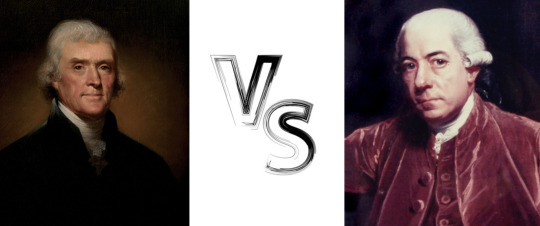
Thomas Jefferson (April 13, 1743 – July 4, 1826) was an American statesman, diplomat, lawyer, architect, and philosopher who served as the third president of the United States from 1801 to 1809. Following the American Revolutionary War and prior to becoming the nation’s third president in 1801, Jefferson was the first United States secretary of state under George Washington and the nation’s second vice president under John Adams.
Starting in 1803, he promoted a western expansionist policy with the Louisiana Purchase and began the process of Indian tribal removal from the newly acquired territory.
Jefferson lived in a planter economy largely dependent upon slavery, and used slave labor for his household, plantation, and workshops. Over his lifetime he owned about 600 slaves.
During his presidency, Jefferson allowed the diffusion of slavery into the Louisiana Territory hoping to prevent slave uprisings in Virginia and to prevent South Carolina secession. In 1804, in a compromise on the slavery issue, Jefferson and Congress banned domestic slave trafficking for one year into the Louisiana Territory.
In 1819, Jefferson strongly opposed a Missouri statehood application amendment that banned domestic slave importation and freed slaves at the age of 25 on grounds it would destroy the union.
Jefferson never freed most of his slaves, and he remained silent on the issue while he was president.
Since the 1790s, Jefferson was rumored to have had children by his sister-in-law and slave Sally Hemings, known as the Jefferson-Hemings controversy. According to scholarly consensus…as well as oral history, Jefferson probably fathered at least six children with Hemings.
---
Henry Laurens (March 6, 1724 [O.S. February 24, 1723] – December 8, 1792) was an American Founding Father, merchant, slave trader, and rice planter from South Carolina who became a political leader during the Revolutionary War. A delegate to the Second Continental Congress, Laurens succeeded John Hancock as its president. He was a signatory to the Articles of Confederation and, as president, presided over its passage.
Laurens had earned great wealth as a partner in the largest slave-trading house in North America, Austin and Laurens. In the 1750s alone, this Charleston firm oversaw the sale of more than 8,000 enslaved Africans.
Laurens’ oldest son, Colonel John Laurens, was killed in 1782 in the Battle of the Combahee River, as one of the last casualties of the Revolutionary War. He had supported enlisting and freeing slaves for the war effort and suggested to his father that he begin with the 40 he stood to inherit. He had urged his father to free the family’s slaves, but although conflicted, Henry Laurens never manumitted his 260 slaves.
---
By popular vote, this final round will run for one full week
Please reblog so we can get the biggest sample size possible and figure who is TRULY the worst
#founding father bracket#worst founding father#founding fathers#amrev#brackets#polls#thomas jefferson#henry laurens#FINAL ROUND#the fact that i have books about both of these men on my bookshelves 💀
139 notes
·
View notes
Text
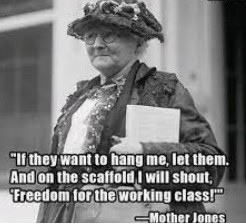
Today in Labor History November 30, 1930: Mother Jones died, age 100, in Silver Spring, Maryland. She was an organizer or "walking delegate" for the United Mine Workers (UMW), famous for her bravado. When she and 3,000 women were released by a militia after being held all night in McAdoo, Pennsylvania, they marched straight to the hotel housing the soldiers and ate their breakfast. Even well into her 90s, she still roamed through the hills of West Virginia, encouraging miners to organize.
#WorkingClass #LaborHistory #MotherJones #union #strike #solidarity #FreeSpeech #prison #coal #mining #WestVirginia
#working class#mother jones#labor history#wage slavery#slavery#history#class war#workers rights#worker solidarity#workers solidarity#ausgov#politas#auspol#tasgov#taspol#australia#fuck neoliberals#neoliberal capitalism#anthony albanese#albanese government#eat the rich#eat the fucking rich#fuck the gop#fuck the police#fuck the patriarchy#fuck the supreme court#fuck the tories#anti slavery#antifascist#antifaschistische aktion
31 notes
·
View notes
Text
Gustaf Kilander at The Independent:
Some Republicans are openly having second thoughts about former President Donald Trump’s choice of running mate, Ohio Senator JD Vance. The senator has received negative attention after old clips resurfaced of him calling some Democrats, including Vice President and presumptive Democratic nominee Kamala Harris, “childless cat ladies” and arguing that people with children should have more influence over the future of the country than those without children. The vice president has two stepchildren.
Harris, who would be the first Black South Asian woman president, has broken numerous fundraising records and she has secured enough delegates to claim the nomination at the Democratic National Convention next month. Ben Shapiro, a conservative commentator, recently said on his show, “If you had a time machine, if you go back two weeks, would [Trump] have picked JD Vance again? I doubt it.” “I think he probably would have picked someone like [Governor] Glenn Youngkin from Virginia in an attempt to broaden out his base,” he added. “There was clearly zero vetting of JD Vance. Clearly a vibes pick by an overconfident Trump that is proving to be a disaster,” former Trump White House Communications Director Alyssa Farah Griffin wrote on X after The New York Times revealed that Vance wrote “I hate the police” in an email after the killing of 18-year-old Black man Michael Brown by a white officer in October 2014.
“Given the number of negative experiences I’ve had in the past few years, I can’t imagine what a Black guy goes through,” he added at the time. Wisconsin Republican strategist Bill McCosten told Politico that “Of the people that were mentioned as finalists, he had the most risk, because he had never been vetted nationally.” He added, “Doug Burgum ran for president, he had been vetted, mostly. Marco Rubio has run for president, he had been vetted. JD Vance hadn’t. So there was risk in the pick. And we’re going to see over the next 102 days how he stands up to the bright lights of a national campaign.” A member of the House Republican caucus anonymously told the outlet: “Find me one publicly elected official in the Senate who is pushing JD Vance other than [Utah Republican Senator] Mike Lee. I’ll wait.”
Is Donald Trump beginning to regret his pick of J.D. Vance for VP yet?
Vance has been nothing but a liability to the ticket, and if Trump loses, picking Vance instead of Doug Burgum, Marco Rubio, or Glenn Youngkin may well cost him a victory.
Trump wanted Burgum, but his two sons Eric and Donald Jr. wanted Vance instead, and the sons won out.
#2024 Presidential Election#2024 Elections#2024 Veepstakes#Veepstakes#Donald Trump#J.D. Vance#Doug Burgum#Marco Rubio#Glenn Youngkin#Alyssa Farah Griffin#Ben Shapiro
16 notes
·
View notes